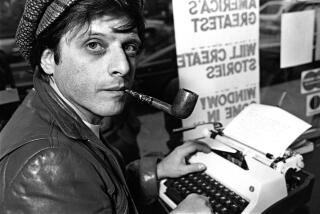America’s History May Not Be Written by Americans : THE 27TH CITY<i> by Jonathan Franzen (Farrar, Straus & Giroux: $19.95; 517 pp.) </i>
Jonathan Franzen has written a novel of our times; so imaginatively and expansively of our times, that it seems ahead of them. The news we get about ourselves is always a little out of date. Anyone able to look very hard at where we are right now edges on prophesy.
“The 27th City” is Franzen’s first novel. The reader may feel like a college confronted with an A-plus applicant who is a star basketball player, worked last summer in the Guayaquil slums, hacked his way into the computer at the National Security Agency, wrote a sonnet sequence in demotic Greek, and climbed Mt. Washington backwards.
A sprawl of talents; sometimes, a tangle of them. “City” is a book of far-fetched conspiracy and comic outlandishness that manages, like the least adjustment of a faceted glass, to refract a distorted image into a startlingly exact one.
It hitches a troubling reflection to a Marx Brothers premise. The reflection: The United States is in a decline--in its economy, its health, its social vigor--and risks being superseded by non-Western societies of greater discipline and purpose.
The premise--farcical and something more: The decaying St. Louis, once the fourth of our cities, now the 27th, appoints a non-Westerner as its new police chief. Not a Japanese, as it happens, but an Indian.
She is Jammu, the former chief of police of Bombay, a disciple of Indira Gandhi, and a secret member of an activist left-wing cell known as the People’s Reading Society. Once in office, Jammu infiltrates St. Louis with her Indian associates, marries one of them to the head of the leading brewery family, and organizes a giant scheme to take the place over through a mixture of terror, clandestine surveillance, psychological warfare and old-fashioned politicking.
Downtown St. Louis, when Jammu arrives, is a moribund slum. The major industries and the prosperous residents are in the suburbs. Through a complex series of maneuvers, Jammu stimulates a phenomenon that has taken place in a number of American cities: The rehabilitation of the urban center.
With her control of the police and her alliances with other city agencies, she gets the support of black and white businessmen and politicians who stand to make huge profits by buying up the derelict properties and seeing their value rise. She then persuades and brow-beats the area’s principal enterprises to move back into town.
The slogan is urban reform and hope for the urban poor. The reality is the profits to be made by a few from any such massive economic shift; and the fact that the underclasses will end up not bettered but evicted.
A share of the profits will go to Jammu and her Indian backers; but for her, the point is personal power and a mystical need to make things happen.
Franzen means business. The theme and the plot--overactive as a colt and with similar moments of purposeless energy--turn grim and bloody. But the notion of an Indian woman who is part child and part witch, who is terrifying, humorless and comical; the notion of this figure taking over a stodgy Midwestern Establishment has all kinds of farcical possibilities, and the author develops them with almost lyrical wit. Pleasing the reader is not the least of his aims.
Thus, after Jammu’s friend marries the brewer to raise capital for the scheme, Franzen writes:
“A week later the sightings began. An Indian family of 10 was seen standing on a traffic island one block east of the Cervantes Convention Center. The women wore saris, the men dark business suits, the children gym shorts and T-shirts. All of them wore expressions of controlled annoyance.”
When one of Jammu’s aides goes about checking the bugs they have installed in the homes of leading citizens, he takes along M & M’s for lunch because they leave no crumbs. And when Jammu gives a financial report to the representative sent over from India by her mother--who runs the family’s enterprises and is upset that the first year’s profits are only 120%--she lies in bed with him, alternating statistics with sexual instructions from the Kama Sutra.
The farce, never overdone, is more than entertaining embroidery. It adds to the sense of estrangement that Franzen so successfully achieves.
Jammu’s plot to get St. Louis in her power is essentially a way for the author to tell an American story--urban decline, racial tensions, the maneuverings of money, power and politics--in terms of an outside perception. In this case, it is that of the Third World. His message, finally and shatteringly enough, is that perhaps American history will not, ultimately be written by Americans.
Farce ignites into something blacker. Jammu’s drive for power is utterly without inhibition. Her police burn down slums to hasten the clearances. Her agents bomb the parking lot of a leading TV broadcaster; later, a helicopter sprays his home with machine-gun bullets. A terrorist group mysteriously makes its appearance, blowing up bridges and ensuring the expansion of the police force.
In particular, Jammu brainwashes her opponents by continual attacks on their personal equanimity. Her main antagonist and target is Probst, builder of the St. Louis Arch, and a symbol of civic integrity.
Probst’s dog is run over. A young man is led, by the most arcane means, to seduce Probst’s daughter and take her across town to live with him. Singh, Jammu’s charming, bi-sexual lieutenant, seduces Probst’s wife, Barbara, and then kidnaps her to a hide-out in East St. Louis. Finally, Jammu completes Probst’s disorientation by seducing him herself.
This works, for a while. Probst reverses his steadfast opposition to the amalgamation of St. Louis and the surrounding county. This measure, put to a referendum, is to be the capstone of Jammu’s efforts. Beleaguered and seduced, Probst reflects: “To vote no was a nice thing. To vote yes was a nice thing.”
It is Franzen’s way of making his point. American politics offers images more than choices. Power consists of manipulating the images, of making the choices seem unimportant. “America,” he writes, “was outgrowing the age of action.”
Ironically, Jammu’s success increating apathy turns out to be her failure. Her referendum is so unanimously touted to win that only the opponents bother to vote.
Franzen succeeds extraordinarily well in joining his somber message to the incandescences of his story. The story itself suffers from a number of things. Like someone who goes on talking--wittily, to be sure--long after he has made his point, Franzen’s plot tends to lose itself in its own convolutions.
His American characters are dimly drawn for the most part, and afflicted--purposely, no doubt--with terminal blandness. Most damagingly, Probst, whose role is central, never quite comes into focus. We see him but we don’t really sense him.
His Indians, on the other hand, are complex, elusive and intensely vivid. Jammu--dutiful daughter, implacable plotter and twisted by an unappeasable hunger--is unfathomable and unforgettable. Singh, her even more elusive confidant, has a terrifying radiance. It casts an extraordinary backlight on the whole book. At the end, after the whole scheme collapses, we see him on a Bombay street, anonymous once more and rejoining a multitude whose facelessness we will never again take for granted.
More to Read
Sign up for our Book Club newsletter
Get the latest news, events and more from the Los Angeles Times Book Club, and help us get L.A. reading and talking.
You may occasionally receive promotional content from the Los Angeles Times.





